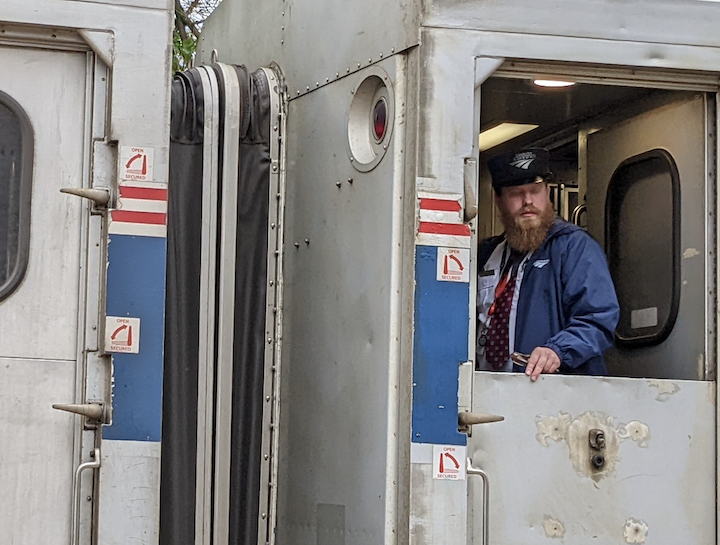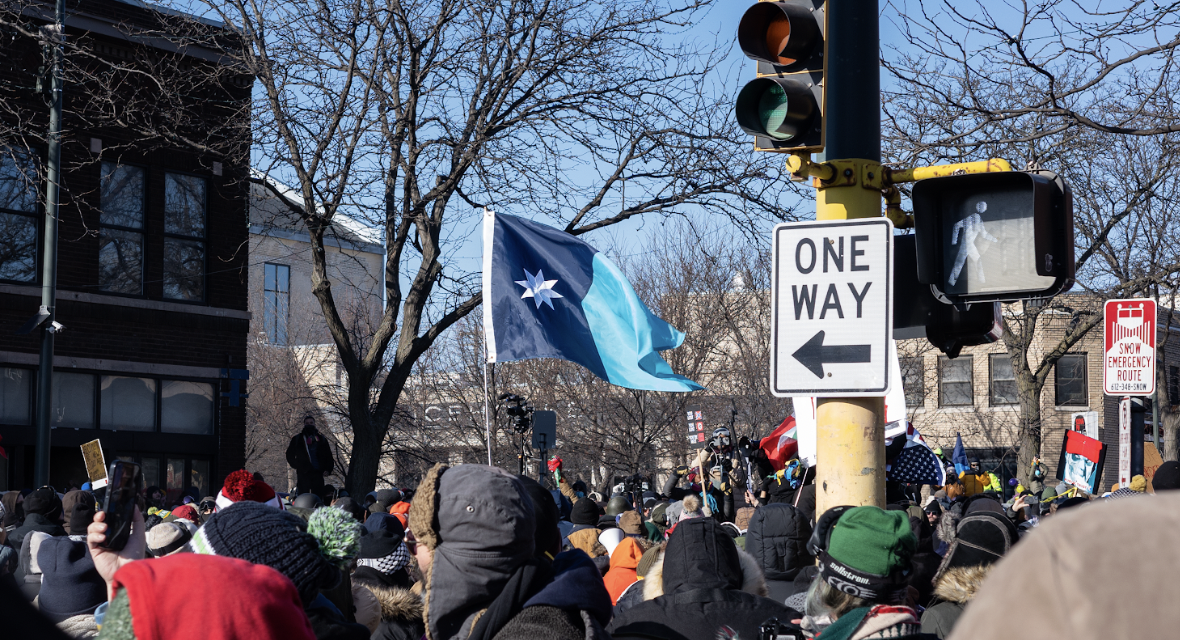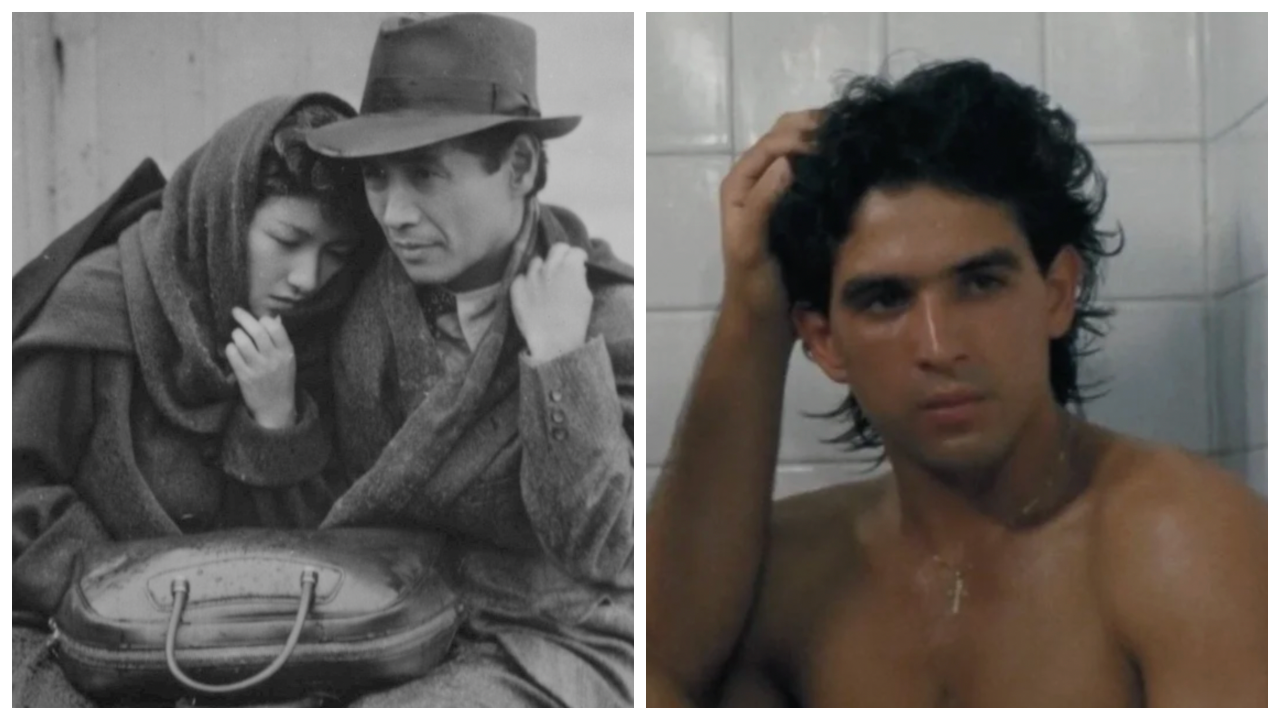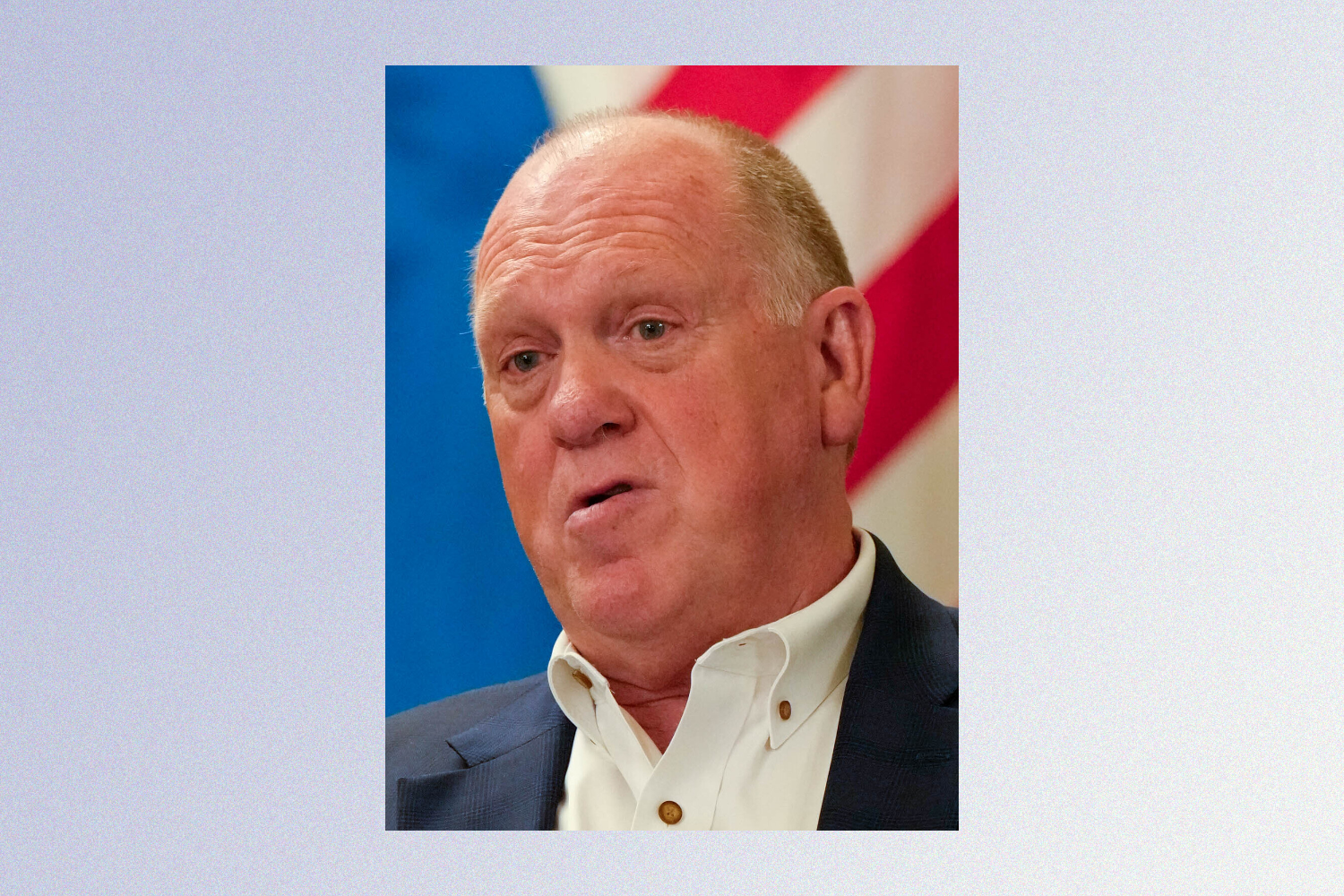You could have asked for more picturesque weather as the Borealis pulled out of the Union Depot in St. Paul last Friday. It was overcast in a way that didn’t feel gloomy or ominous, just aggressively neutral, like someone had forgotten to turn the sky on that morning. But travelers can’t be choosers, and I had a mission to complete.
You’ve probably heard by now about The Borealis, the much-hyped new Amtrak line that travels from St. Paul to Chicago and back, with nine station stops in between. For the first time in 46 years, Minnesota has twice-daily service to Chicago, and the Borealis is not only timed more conveniently than The Empire Builder, which connects Seattle and Chicago, but with rates starting at $41 one way it’s cheaper too.
The better-connected outlets in town had already ridden along on the Borealis’s May 21 inaugural trip, where they were greeted with pomp in each station along the way. My own trip would be more lowkey, and leisurely, with overnight Wisconsin stops in the Dells and Milwaukee, a quick stay in Chicago, and then a straight shot back home Tuesday.
For five days, I could surrender control of my life to the leisurely rhythms of the train. Am I hungry? I can eat. Tired? I can nap. Is the Wi-Fi a bit spotty? I could read. I would have absolutely nowhere to be, and therefore no reason to be impatient.
I could only guess what the next five days would have in store for me. The strangers I would meet! The sights I might see! And the thoughts to be thunk! Would I have travel-spawned epiphanies about my life or (gasp!) 21st century America? I certainly hoped not, but once you leave your home for long enough you can never quite rule anything out.
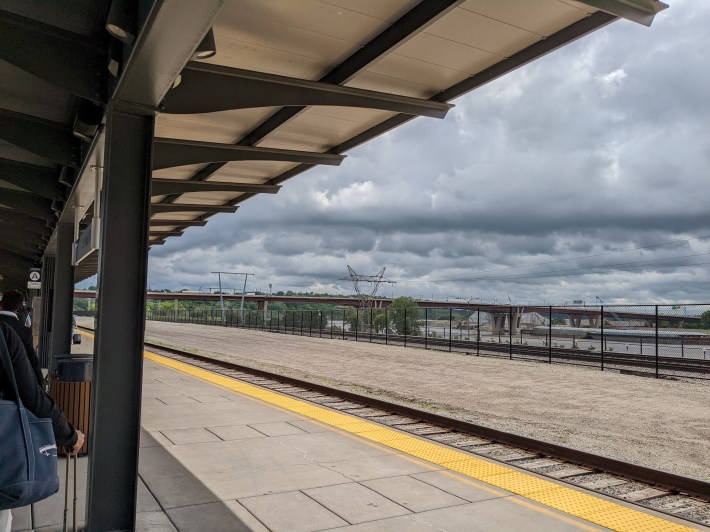
Hamad asks where I’m from, as though he detects a lingering East Coast note in my voice. (I think I was just congested.) The young Union Depot security worker was born in Turkey, where his Somali family moved in the early 20th century. “The Ottoman Empire was a hub of culture,” he tells me in a tone of such wonder that even when he expresses disappointment in the young “liberal” Turks I can feel some part of the appeal of his possibly distressing Make Turkey Great Again beliefs.
Hamad guides me to where a throng of people who are more excited to be traveling for seven and a half hours than most of us usually are. Everyone wants to tell you where they’re going—a sister’s baby shower in Evanston, Illinois, a wedding in Milwaukee. “I haven’t been on a train in seven years,” one woman exclaims to another. More than once, when I disclose my purpose for being here, I have to explain that I am no real “train buff.”
In truth, my experience with trains is limited and shockingly unnoteworthy. Growing up in New Jersey, my route to New York was NJ Transit, a shabby and utilitarian local commuter rail service. Your reward for a clackety crawl through North Jersey was a plunge into the steaming bowels of Penn Station, a hellish traveler repository that is neither grand nor central, perpetually spewing residents of the tri-state area upward into the Sbarro-ridden congestion of Midtown.
Amtrak also runs along the NE Corridor, but its rides were discouragingly if not quite prohibitively expensive—for special occasions, like shrimp cocktail. As a kid, I assumed its passengers were some vaguely defined “business people.” This Borealis ride would be my first extended Amtrak trip.
Everyone is in such high spirits that it’s almost a relief once we get on board and a good old-fashioned family squabble pierces the mood. Do the bickering parents and child also leave their notifications on, so their phones ping constantly? Do they gab on speaker phone? Watch TikToks aloud? Indeed they do. Whatever illusions I have about the glamor of train travel soon dissipate in the presence of everyday self-absorbed people, so I just gaze out the window at the Mississippi River as we roll on to Red Wing, past Winona, and finally on into Wisconsin.
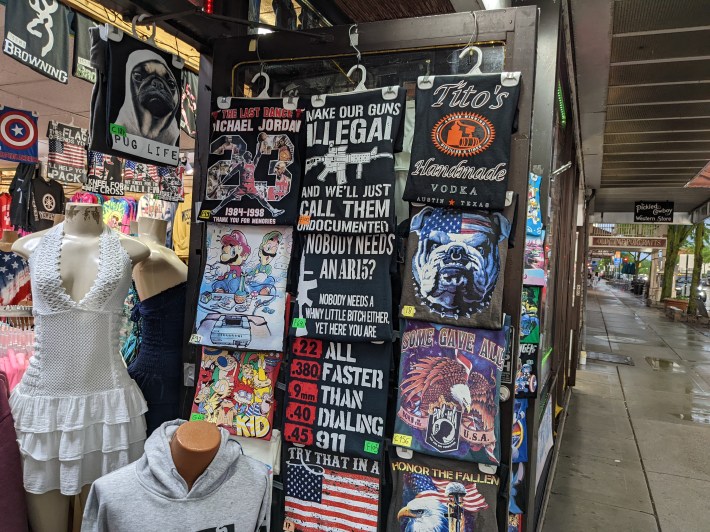
And soon it’s time to eat. The term “cafe car” may initially summon up images of Hitchockian elegance, but not once the attendant announces that shoes must be worn when entering the car. And truly, I can’t imagine Cary Grant chomping on the same reheated “deluxe” stromboli ($7.50) that I have for lunch, and he’d probably be able to resist being upsold a bag of Doritos. I drink my Coke through a straw—I do have some class, you know.
The downtown Wisconsin Dells, if you’ll forgive my East Coast bias, looks like a seedy shore town that had been caught up in a tornado and dropped down a thousand miles from the ocean.
The streets are lined with the sort of last-ditch entertainments you turn to when the weather’s too lousy for water slides and your kids start whining about the worst vacation ever. There’s a haunted mansion as well as something called “Wizard Quest,” and I can’t imagine any town has more Old Time Photo joints per square foot. But beware, for lies abound. The Root Beer Museum was not much of a museum, and the House of Jerky? Constructed strictly from conventional building materials.
The motel manager has news to share when I check in—her cat was just selected for an online calendar! I never see her again, not when I check out, not when I try to report a toilet issue (not of my making). For $60 a night, my barebones motel room serves its purpose, even if the TV only seems to get the Universal Kids network, and a landscape painting sits unhung in a nook, turned to the wall. I am, after all, a simple man. Give me a bed and running water and my only additional request is that I not be murdered in my sleep.
If you’re someone eager to draw glum conclusions about the future of our nation from images, anecdotes, and vibes, the Dells offers dismaying portents for sure. For starters, that Jersey Shore energy definitely extends to the Dells’ T-shirt game, with shops offering you the opportunity to emblazon “IT COSTS $0.00 TO PUNCH YOU IN THE FACE AND I LOVE FREE SHIT” across your chest. And yet, I do remember the shirts along the boardwalk having more to do with regretting drunken hookups and less to do with firearms. Do shirts reading “MAKE OUR GUNS ILLEGAL AND WE’LL JUST CALL THEM UNDOCUMENTED” and “NOBODY NEEDS AN AR15? NOBODY NEEDS A WHINY LITTLE BITCH EITHER, YET HERE YOU ARE” represent regional differences or a shift in our nation’s temperament? Either way, they don’t quite prepare me for this:
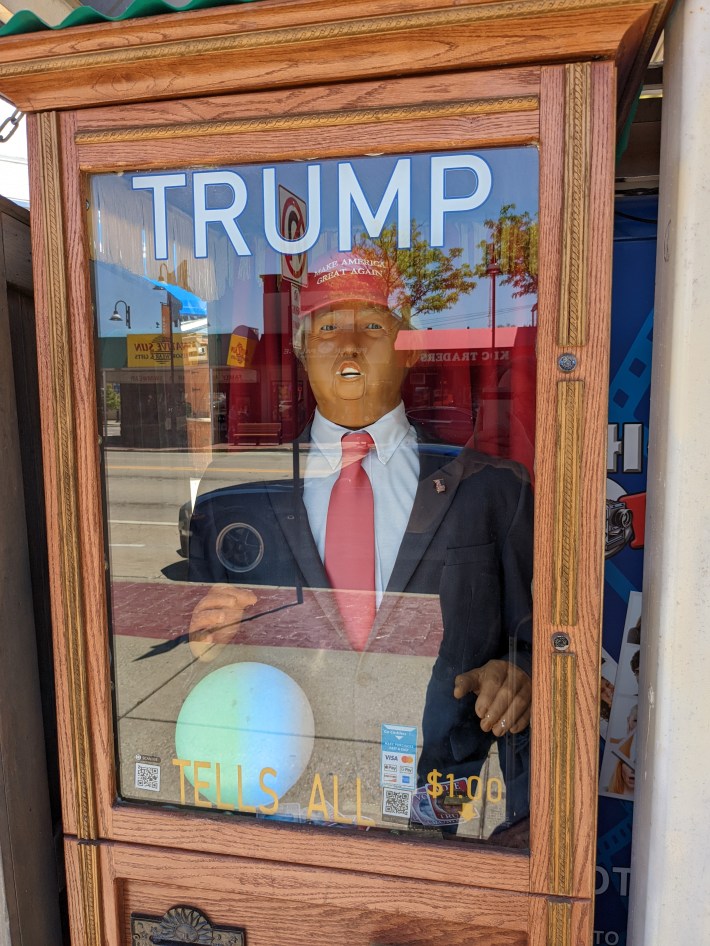
But the sky is blue the next morning and the Wisconsin River reminds me that this particular geographic location didn’t become a tourist site just because it’s midway between two major cities. With boat tours a little outside my budget, I settle for some excellent views from the River Walk before heading back to the station. I pass a newly married couple who’d chosen to get hitched at this vacation town’s obliging little chapel, Dells Bells. (Just $425 for 50 minutes, or get married for just $195 and never leave your car!)
Demar had gotten off the last train headed from Chicago. A Jamaican student in the States for the summer, he’ll be working at a Cracker Barrel. He’d been in the U.S. twice before, both times in Alaska, where he stocked shelves at a Fred Meyer and met students from all over the world. “It’s supposed to be for ‘cultural exchange,’” he tells me, “but I’m here to make money!” And he’s got all kinds of it—he proudly shows me his collection of laminated bills, from New Zealand, the Netherlands, even an old note from Yugoslavia.

His accent doesn’t seem too strong till I ask where he’s staying and he says “Highwater.” Or maybe that’s “Hiwater”? He shakes his head and borrows my phone and types in “Hiawatha.”
The two men you see behind Demar are father and son trainspotters out of Columbus, Wisconsin, who took the new train down to the Dells. The dad is particularly effusive, in ways my train-ignorant brain can barely comprehend, about certain makes of car on the freight train due down the line a little later. “Since the Kansas City Southern and the Canadian Pacific merger, you’re seeing a lot of cars you’d never see in this part of the country before,” he explains, and before I can ask where he gets his information, the Borealis emerges on the horizon and the photographers spring into action.
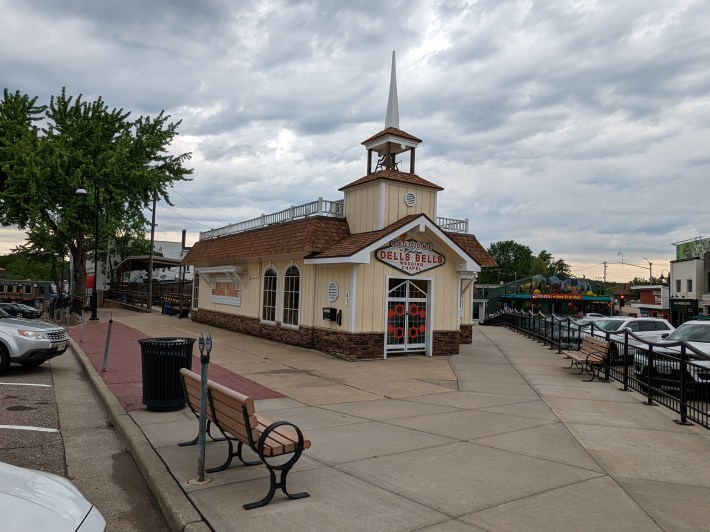
We may hate when coastal snobs yawn about “flyover states,” but even the most egalitarian of us know that there are “drive-thru states.” I grew up in one—New Jersey is perhaps the archetypical drive-thru state, experienced by most travelers as pure vacation filler, less a journey than a delay in reaching their destination. Well, Wisconsin is the New Jersey of the Upper Midwest, and not just when it comes to trashy T-shirts.
From the highway Wisconsin assaults you with billboards. Adorable infants share dubious facts about their fetal development. Unenticing tourist traps seek to entice travel-fatigued children and kitsch-craving hipsters. Cheese is universally celebrated. Whenever you break free from a multi-mile summer road construction project, state troopers lay slyly in wait to spot your Minnesota plates.
But the Wisconsin that the train passes through is more sedate. Evidence of humanity is hardly absent—you can even see some fairly nice houses that seem less than ideally situated. It’s still not the most dramatic landscape, but on the train you’re not forced to study it constantly, as you are when driving. You can allow Wisconsin to do its thing while you do yours. And my thing, in this case, is to think some more about trains.
And about planes. When the time comes to walk down the aisle or especially to pee, the jostle of a train can feel oddly similar to flying. (“It’s like surfing,” I hear one dad explain to his daughter as she struggles with balance.) But you can’t relax on a plane, or at least I can’t. You’re always being instructed to do something. Seat up. Tray table back. Do you want a drink or a snack? Now we’re collecting trash. Would you like to sign up for our credit card? I feel too much of a participant in air travel. No one asks anything of you on a train.
It’s hard to imagine now, but trains once felt like time machines to people. In the early days of passenger trains, travelers suffered a strange sort of temporal vertigo. It wasn’t the speed of the locomotives (or the certain discomfort of the ride) that set them off. Their brains simply could not accept that they’d traveled such a great distance in such a short time.
Trains were once so emblematic of progress, of the future, yet even when considering the potential of high speed rail, it’s impossible to recapture what the railroad once meant, as a symbol and as a part of life. Our fascination with trains now feels inescapably tempered by nostalgia, a denial of the supposed freedom of the automobile and the interstate. But maybe we’ve misunderstood what “the future” was all along, and confused how to move “forward” with how to decide what to do next, failing to recognize that we can perfect existing, familiar technology rather than gambling on the unintended consequences of new advances.
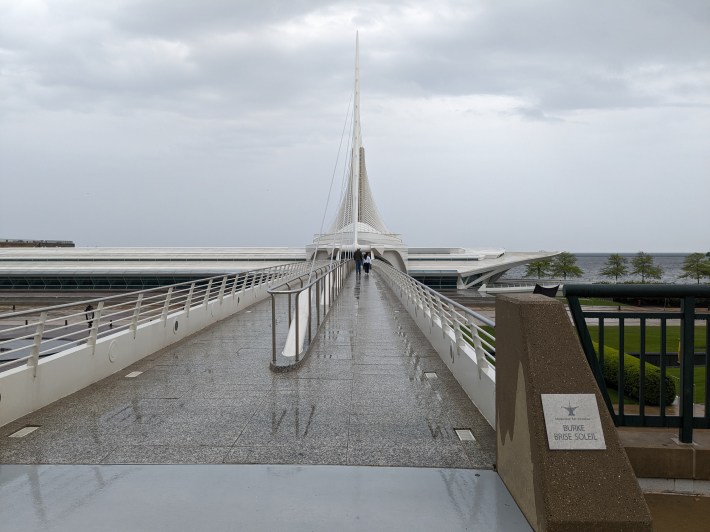
Scared off by the cost of downtown Milwaukee hotels, I nabbed an Airbnb at a cute little bungalow in Sherman Park, maybe a bit deeper into the residential midst of the city than I planned. Will I eventually wind up spending more on Ubers and cabs than I would have for a nice room closer to Lake Michigan? Maybe, but I’ll also have some conversations that I’d otherwise have missed. Welcome to the Tom Friedman section of this essay.
Zeb, who picks me up from up the train station, commiserates about age. (“I’ve been here since 1992, and what’s happened since?” He shrugs away three decades.) Darnell wants to talk labor politics, unprompted. “You guys figure out your Uber situation out there?” he asks when I tell him I’m from Minneapolis. (His take: They’ll find a way to screw the driver no matter how the rates are set.)
And then there’s Steven, who announces “This is the Knight Rider” when I enter his Tesla and then cues up the TV theme. (It slaps, especially on a good sound system.) He tells me how four guys tipped him $20 apiece to let it all out and break 100 mph. If I ever need to enter or exit one of those vehicles again, I’m sure I won’t know how.
You can see a lot of Milwaukee in 24 hours, I know this because I see a fair amount myself and my travel planning is for shit. On a tip from a pal of my coworker Jay’s, I drop in on the Bayview neighborhood, south of downtown, where I eat an excellent pork/lamb sausage and drink an even better NA gin and tonic at a neighborhood joint called Goodkind. Afterward I’m buzzed by three jerky kids on Lime scooters, just goofin’ on the old guy on a Saturday night.
I spend too much of my second day in town walking toward a hip brunch spot in an out of the way neighborhood and then turning back because I don’t want to wait 45 minutes in the drizzle outside. Instead I grab a plate of biscuits and gravy (always the best barometer for how good a breakfast joint is) at a hotel restaurant, the Café at the Plaza. Your dad would have raised an eyebrow at the double-digit price (“for biscuits and gravy!”) but would have nodded with approval at the size of the portions. Your mom would have taken at least half the plate home with her.
There’s an irresistible temptation to make snap judgments about a city when you only spend a short time there, and who am I to resist that impulse? My impression of downtown Milwaukee is that it has preserved many of the buildings that Minneapolis, in its sad midcentury lurch toward misprised modernity, had long ago destroyed. But that may just be my way of saying I saw a lot of pointy old structures with clocks in them.
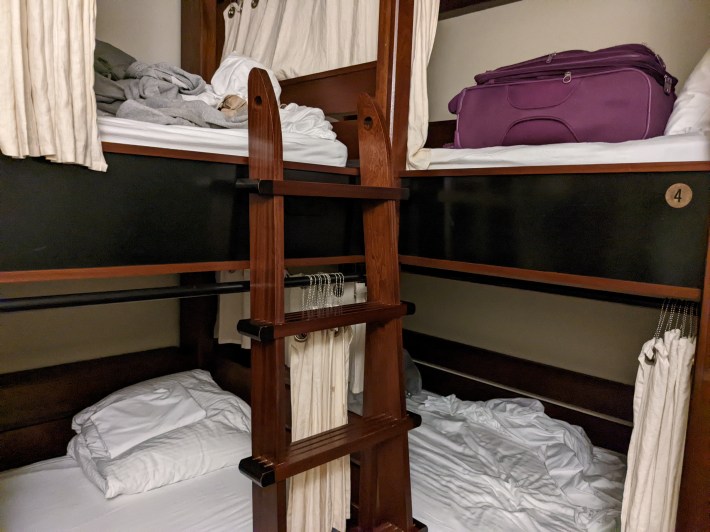
The Sears Tower, or whatever they call that monstrosity these days, looms from miles away like Barad-dûr, casting its dark shadow on all who dare approach. When I lived in Chicago 20 years ago my girlfriend worked in that black tower, and because there’s seemingly nowhere in town you can escape its sight, all weekend it haunted her, a perpetual reminder of Monday on the horizon.
But for all such glimpses of the Chicago skyline, there’s something discreet about train travel, in the way you slide unnoticed through the backside of neighborhoods, past the graffitied bones of the city, before creeping underground. From the moment I emerge into Union Station, which is what a transit hub should look like, with its colonnades and classical fabrications summoning an imagined past, the city announces itself as solidly city-like, with buildings that feel immutable and eternal. Chicago really knows how to make you feel like you’re in Chicago.
I’ve found a way to square my inveterate cheapness and my desire to be at the center of things and booked two nights at Freehand Chicago, a hostel downtown, or more precisely in “River North,” which I’m not sure was even a neighborhood when I lived here several lifetimes ago and worked just a few blocks away. I share a room with three people whose combined age I am relieved to report safely exceeds mine. We don’t talk much. Someone must have thought it’d be funny to give the old guy the top bunk, so he has to scramble up and down a ladder twice a night to pee.
My travel M.O., you may have noticed, is pretty basic—board cheaply, eat well. And so I scrimped on the hostel ($50 a night!) and splurged on a pork shank at The Purple Pig, just a few blocks away on Michigan Avenue. I was right to do so—the meat slid off the bone and there was plenty of it, basted in a red wine reduction with carrots and polenta.
Earlier that day I waited 45 minutes for what I wish the internet had not tried to convince me was one of the best burgers in America. I was at Au Cheval, in the West Loop, the sort of neighborhood where you browse at a nearby Madewell store until your table was ready. Without the hype, I’d have enjoyed the peppery if unremarkable smash burger. Still, it was easily the best of three burgers I consumed on my trip. Then again, one of those was a microwaved patty from the cafe car, and the other, perfectly serviceable, from a Dells sports bar.
Chicago is where I walk. I love moving through that city as much as I hate moving through New York. Chicago is brisk; New York is frantic. The pace in Chicago is set by a need to move across great distances of the city efficiently; New York’s speed-freakery is rooted in a weird compulsion to press any advantage you can. Whether elbowing past barhoppers along State Street on a drizzly night, with women protecting their outfits in cheap, clear plastic ponchos, or strolling along Michigan Ave.as well-heeled families converse in innumerable languages, I find my place here in the rhythm of the crowd.
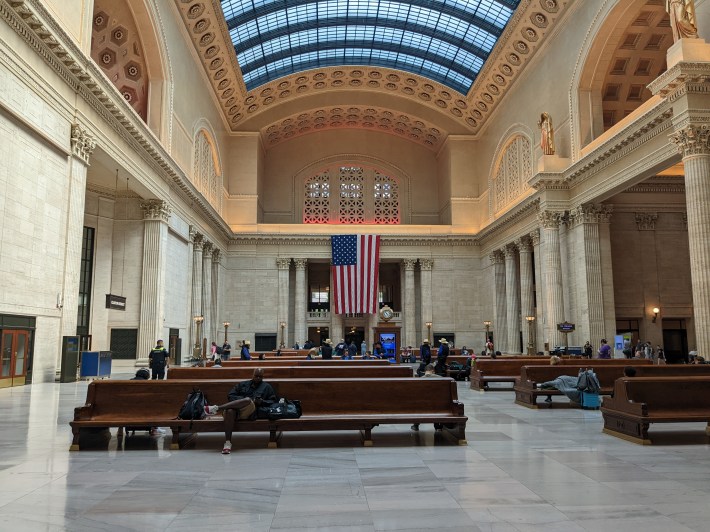
Tuesday at last, and I’m genuinely looking forward to doing nothing more than sitting on a train for seven and a half hours, with no control once more over what I see or do. One problem with staying in a hostel is that everyone has to use the bathroom at the same time, so I forego a shower, brush my teeth quickly, and say goodbye to my roommates, thereby increasing the amount of conversation we’d shared by a good 25%.
At Union Station, the high ceilings create an echo that swallows the music playing—in particular a version of Styx’s “Babe” that sounds like one of those awful, spooky re-recordings they won’t stop using in movie trailers. The station is rife with Amish, as it often is, including one fellow you could have mistaken for Joaquin Phoenix filming a remake of Witness.
Once we board, Joaquin sits in front of me on the train, where he eases his seat back into my laptop (c’mon man, I thought you guys were above the comforts of this world?) and, more than once, grasps the top of his headrest. I’d complain but if there’s one thing the movies have taught me it’s that you do not fuck with that guy.
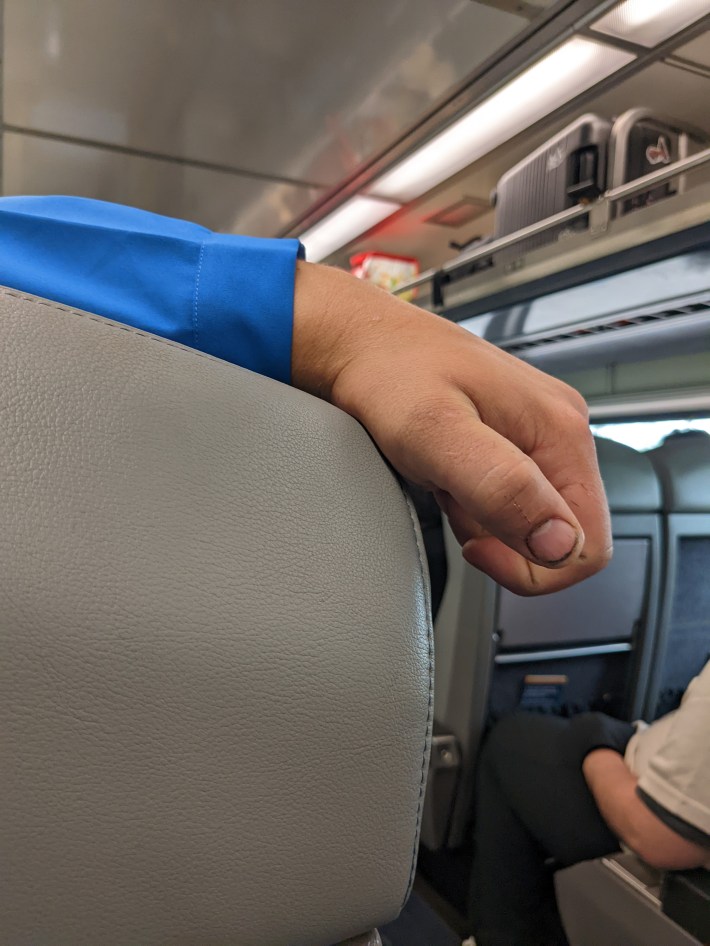
The train is full, though the conductor promises us that 80 passengers will disembark when we reach Milwaukee in 90 minutes. If so, 78 Milwaukeeans quickly replace them, though my car clears out a little more once Joaquin and his cohort get off mid-Wisconsin. (Portage? Columbus? I’ve lost track—get it, track?) And then, something very exciting happened in Winona: We stopped for two whole minutes, allowing smokers a few drags and your humble journalist to stretch his stubby legs and snap a pic of the train station.
Finally, around 6:30 p.m., we’re back at the Union Depot. And as I step back onto the platform in St. Paul, I try to reorient myself to the life I’d paused for five days, and I realize the train still is something like a time machine. Not how it was for passengers in the 19th century; this is more like stepping outside of time for a moment, and then re-entering its stream. I get back in my car for the first time in five days and reacquaint myself with how it feels to control my own destiny.

